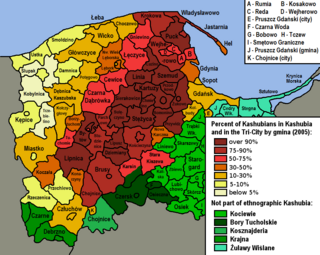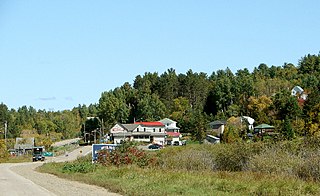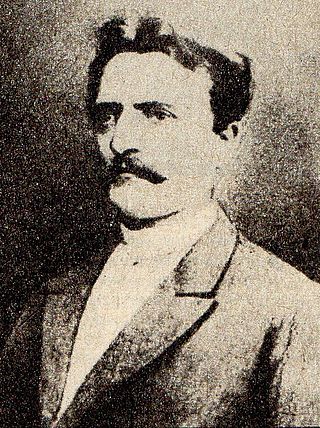Related Research Articles

The Kashubians, also known as Cassubians or Kashubs, are a Lechitic ethnic group native to the historical region of Pomerania, including its eastern part called Pomerelia, in north-central Poland. Their settlement area is referred to as Kashubia. They speak the Kashubian language, which is classified as a separate language closely related to Polish.
Kashubian or Cassubian is a West Slavic language belonging to the Lechitic subgroup.

Wilno is a settlement in the Township Municipality of Madawaska Valley, Renfrew County, Ontario, Canada.
Jan Louis Perkowski is a professor of Slavic Languages and Literatures at the University of Virginia. He has three consecutive degrees including a PhD from Harvard University. He currently resided in Charlottesville until his death in 2023.

Polish Canadians are citizens of Canada with Polish ancestry, and Poles who immigrated to Canada from abroad. At the 2016 Census, there were 1,106,585 Canadians who claimed full or partial Polish heritage.

Żukowo is a town in Kartuzy County, in the Pomeranian Voivodeship of northern Poland in the cultural region of Kashubia, with 6,236 inhabitants (2005). It is located along the Radunia river in the historic Pomerelia, about 19 km (12 mi) southwest of Gdańsk.

Aleksander Majkowski was a Polish-Kashubian writer, poet, journalist, editor, activist, and physician. He was the most important figure in the Kashubian movement before World War II, editor of Gryf, author of the greatest Kashubian novel The Life and Adventures of Remus, and Historia Kaszubów.

Sianowo is a village in the administrative district of Gmina Kartuzy, within Kartuzy County, Pomeranian Voivodeship, in northern Poland. It lies approximately 10 kilometres (6 mi) north-west of Kartuzy and 36 km (22 mi) west of the regional capital Gdańsk. It is located on the eastern shore of Sianowskie Lake, within the ethnocultural region of Kashubia in the historic region of Pomerania.
The Society of Young Kashubians was an association founded in 1912 in Gdańsk (Poland). Its leader was Dr. Aleksander Majkowski, already a well-known Kashubian writer and author of The Life and Adventures of Remus. Other influential members of the association were the attorney Jan Karnowski and two Roman Catholic priests, Leon Heyke and Józef Wrycza.
Józef Franciszek Darzyn Ciemiński was a Polish-born Roman Catholic priest. He emigrated with his parents to the United States in 1881 and was ordained as a Priest in Saint Paul, Minnesota in 1895. He was involved with numerous Polish Catholic parishes during his lifetime including the now closed troubled Parish of Saints Peter and Paul in Duluth, Minnesota, and the parish of Holy Cross in Minneapolis.

The Kashubian Cultural Institute & Polish Museum is a cultural and historical museum, founded in 1979 to preserve the Polish and Kashubian heritage of Winona, Minnesota. Known locally as the Polish Museum, it is housed in a lumber yard office built by the Laird-Norton Lumber Company in 1890, located at 102 Liberty Street in Winona, Minnesota, United States. The museum was formerly known as the Polish Cultural Institute and Museum, but has since updated its name to expand upon the highlights of the Kashubian culture within Winona.
The Kashubian diaspora resulted from the emigration of Kashubians mainly in two waves occurring in the second half of the 19th century. The majority of Kashubian emigrants settled in the United States; others emigrated to Canada and Brazil. An online genealogical project, "The Great Kashubian Migration," is devoted to tracking their settlement patterns. Their reasons for emigration varied. Until the Franco-Prussian War, Kashubians emigrated primarily for economic reasons. After the Franco-Prussian War and especially due to the Kulturkampf, Kashubian emigration accelerated as socio-political factors came into play. In his 1899 book, Statystyka ludnosci kaszubskiej, the Kashubophile linguist and sociologist Stefan Ramult estimated that 130,700 Kashubians were living in the Americas.

Hieronim Derdowski, Kashubian-Polish intellectual and activist, was born to Kashubian parents in the Pomeranian village of Wiele. By the time Derdowski emigrated to the United States in 1885, he had already studied for the Roman Catholic priesthood, been repeatedly incarcerated by the German authorities, and edited a newspaper in the city of Torun. At the time, however, Derdowski was better known as a poet. Within two years of reaching the United States he became editor of the Winona, Minnesota Polish-language newspaper Wiarus. In this role he gained a reputation as a strong voice for the Polish-American community, also known as Polonia.
Marian Jeliński was born in Siemirowice, in 1949. Jeliński is a recognized authority in bee diseases and an active member of the Kashubian community. He is involved in a range of activities focusing on the preservation of the Kashubian language and culture. Jeliński is also known for his support of Kashubian embroidery and building bridges between Kashubian communities in Poland and Canada. He and his wife, Alicja, have two sons and currently live in Żukowo, near Gdańsk, Poland.
Life and Adventures of Remus - the Kashubian Mirror is a novel written in the Kashubian language by Dr. Aleksander Majkowski (1876–1938). The linguist Gerald Green regards Life and Adventures of Remus as the Kashubian language's only novel; while theirs is more a scholarly judgement than an objective truth, the preeminence of Life And Adventures to Kashubian literature is undeniable. Although Dr. Majkowski was a prolific author and wrote on a wide range of Kashubian topics, Life and Adventures is considered his master work. Dr. Majkowski worked on Life and Adventures from his college days on, and the novel was only published in its three-book entirety shortly after his 1938 death.

Szimón Krofey was born in 1545 in the Kashubian village of Dąbie, Gmina Bytów, Poland. From paternal side he had German (Prussian) blood from his great great grand father who married a Kashubian woman. His father, Wawrzyniec Krofey, was the mayor of Dąbie, and was well enough off to send young Szimón off to the university at Wittenberg. In 1579, after finishing his studies, he became pastor of the Lutheran church in Bytów.

Leon Heyke was a Roman Catholic priest, theologian, educator, poet and Kashubian-Polish activist.
Paul Joseph Breza, Roman Catholic priest and Kashubian American activist, was born in Winona, Minnesota on June 23, 1937, the son of Joseph Peter and Alice Seraphine (Pehler) Breza, both of whom were descendants of Kashubian immigrants from Bytów, Poland. He was educated at Saint Stanislaus Kostka School, Cotter High School and Saint Mary's University of Minnesota.
Józef Wrycza was a Roman Catholic priest, social activist, and military chaplain. He was born in what is now Zblewo, Poland to Franciszek and Franciszka (Trocha) Wryca, who were of Kashubian ethnicity. From 1894 to 1899 he attended the Collegium Marianum at Pelplin. He began his high school education at Chełmno and completed it in 1904 at the Collegium Leoninum at Wejherowo, where one of his classmates was the future German SS general Erich von dem Bach-Zelewski. Later that year he began studies at the Pelplin Higher Seminary and, on 23 February 1908, he was ordained a Roman Catholic priest.

The Kashubian Association is a Poland-based association for Kashubians with the aim of developing the national, civic and cultural awareness of Kashubians from around the world. In particular, it is calling for recognizing the Kashubian as an ethnic minority in Poland: in the current Polish law on minorities, the only right the Kashubians enjoy is the status of their language as regional.
References
- ↑ Ramon Gonzales, Scripture scholar translated poem Archived 2013-01-15 at archive.today , Western Catholic Reporter, July 3, 2006.
- ↑ "Canadian Kashub Leaders". Archived from the original on 2012-03-23. Retrieved 2012-11-17.
- ↑ Wilno Heritage Society Events at www.wilno.org